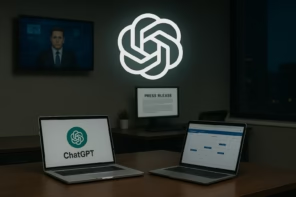
Monday July 28, 2025
How AI Could Be Reshaping the PR Brain
But a recent study from MIT Media Lab, titled Your Brain on ChatGPT, offers a sharp pause for thought. In it, researchers observed participants using either ChatGPT, Google Search, or nothing at all to write essays. They monitored brain activity using EEG headsets, analysed the written output, and even tested memory recall.
Here’s what they found:
- Participants who used ChatGPT showed reduced brain connectivity, especially in areas tied to memory and critical thinking.
- They had a weaker sense of ownership over their writing.
- They struggled to recall what they’d written, even just minutes later.
- Their essays looked strikingly similar to one another.
In contrast, those who wrote using only their brain had stronger neural engagement, more original content, and better recall.
That’s not just an academic footnote. It has serious implications for PR.
Are we thinking less because tools are thinking for us?
This phenomenon is called cognitive offloading – outsourcing mental effort to external tools. It’s not new.
When calculators became widespread, researchers observed a dip in students’ numeracy skills. A study by the Educational Research Centre in Ireland found that excessive calculator use led to poorer mental arithmetic and estimation abilities, especially in early learners.
The study, titled “The Effects of Calculator Use on Mathematics in Schools and in the Certificate Examinations: Final Report on Phase II,“ was published in 2008. It involved administering mathematics tests to nationally representative samples of third-year students before and after the introduction of calculators into the Junior Certificate mathematics curriculum. The findings indicated that while calculators can aid in performing complex calculations, their overuse may lead to a decline in students’ mental computation and estimation skills. Specifically, students who relied heavily on calculators demonstrated weaker performance in tasks requiring mental arithmetic compared to those who did not use calculators.
In PR, something similar could be happening. A professional who leans too heavily on AI may find it harder to construct original narratives or recall key messaging without assistance. They might rely on AI to generate ideas instead of wrestling with the brief or the audience first. Over time, this could lead to a subtle decline in creative stamina and critical judgment.
It’s a concern echoed by Ben Verinder, founder of Chalkstream and a prominent voice in AI education in PR, who warns that this over-reliance doesn’t just dull our skills, but also our judgement: “We risk reducing our competency in a wide range of skills if we hand them over wholesale to AI. Not only that, our ability to judge the quality of AI’s output reduces as our competency declines. Mitigating this risk at a personal and team level requires intentional, ruthless retention of some tasks, even if AI is judged to perform them better.”
His advice? Be strategic about which tasks you retain, even when AI can do them. “That doesn’t mean holding on to all the work that AI might do for us, but it does mean being strategic and deliberate in deciding to ‘keep our hand in’. This, I think, is especially important when it comes to tasks such as copywriting, where authenticity and interpersonal, inter-human connection is also so important.
And in a field where words matter, and context is king, that’s risky.
AI is flattening the edges of our message
Another insight from the study: ChatGPT-written essays were highly similar in vocabulary, structure and even named references. The NLP analysis showed clusters of near-identical phrasing across different users.
That’s not surprising. AI is trained on probabilities. It tends to generate what’s most likely, not what’s most daring.
In a competitive PR landscape, this means that the more we rely on AI, the more indistinguishable our content becomes. Pitches begin to sound the same. Thought leadership becomes templated. Brand voices lose their edges.
Andrew Bruce Smith, Chair of the CIPR’s AI in PR Panel, comments: “The key is treating AI as what one expert calls “an enthusiastic but somewhat naive assistant” rather than a replacement for critical thinking – prompt it at each step of your strategic process rather than asking for final outputs. Always apply your professional judgment, brand expertise, and creative refinement to any AI-generated content.”
Clients don’t hire agencies to sound like everyone else. They hire them to sound like themselves, sharp, distinct, memorable. That kind of communication still demands human judgment and creative dissonance. Not just fluency.
As Andrew puts it: “Use AI to overcome the “blank page problem” and generate initial drafts, but ensure every message reflects the nuanced understanding of client voice, audience psychology, and strategic context that only experienced PR professionals can provide.”
What PR teams should be doing differently
AI is here to stay, and it’s not about turning the tools off. It’s about using them with intention. Here’s how PR teams can stay smart:
- Start human, then layer AI: Use team brainstorming or individual scoping before involving ChatGPT in drafts.
- Use AI as a second brain, not the first: Let AI test logic or tighten language, but not form your first idea.
- Review for sameness: If a draft sounds a little too polished or predictable, it probably is.
- Train for memory and mastery: Rehearse key messages without a script. Practice responding without the prompt.
- Stay curious: AI can answer, but it doesn’t wonder. That’s still our job.
This study is a helpful reminder that ease is not always the same as effectiveness. In a profession built on persuasion, nuance and memory, we shouldn’t let the tools do too much of the thinking for us. The PR brain still matters. Let’s keep using it.
Curzon PR is a London-based PR firm working with clients globally. If you have any questions, please feel free to contact our Business Development Team bd@curzonpr.com







Follow us